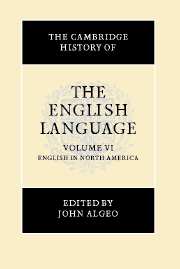Book contents
- Frontmatter
- 1 EXTERNAL HISTORY
- 2 BRITISH AND AMERICAN, CONTINUITY AND DIVERGENCE
- 3 BRITISH AND IRISH ANTECEDENTS
- 4 CONTACT WITH OTHER LANGUAGES
- 5 AMERICANISMS
- 6 SLANG
- 7 DIALECTS
- 8 AFRICAN-AMERICAN ENGLISH
- 9 GRAMMATICAL STRUCTURE
- 10 SPELLING
- 11 USAGE
- 12 CANADIAN ENGLISH
- 13 NEWFOUNDLAND ENGLISH
- 14 American English Abroad
- Glossary of Linguistic Terms
- Bibliography
- Index
- THE CAMBRIDGE HISTORY OF THE ENGLISH LANGUAGE
5 - AMERICANISMS
Published online by Cambridge University Press: 28 March 2008
- Frontmatter
- 1 EXTERNAL HISTORY
- 2 BRITISH AND AMERICAN, CONTINUITY AND DIVERGENCE
- 3 BRITISH AND IRISH ANTECEDENTS
- 4 CONTACT WITH OTHER LANGUAGES
- 5 AMERICANISMS
- 6 SLANG
- 7 DIALECTS
- 8 AFRICAN-AMERICAN ENGLISH
- 9 GRAMMATICAL STRUCTURE
- 10 SPELLING
- 11 USAGE
- 12 CANADIAN ENGLISH
- 13 NEWFOUNDLAND ENGLISH
- 14 American English Abroad
- Glossary of Linguistic Terms
- Bibliography
- Index
- THE CAMBRIDGE HISTORY OF THE ENGLISH LANGUAGE
Summary
Introduction
The use of English as the de facto, though unofficial, language of the United States is a natural consequence of history. English, the language of the settlements from which the present nation grew, continued at first to be used just as it was in the motherland. But a gradual loss of contact between that motherland and the colonies and, more important, the natural growth of the language in the new land from the experiences of its speakers there produced many differences, which the Revolution and new nationhood were greatly to increase. So in four centuries a new growth has developed on the “family tree.” The aptness of the arboreal metaphor for the English language, with British English as the trunk from which American, Canadian, Australian, South African, and other branches have grown, has been questioned by John Algeo (“What Is a Briticism?” 1992b), who rightly points out that until the development of American English, there was no “British” English against which to compare it, there was simply English. That is, British English, as surely as American English, was born in 1776. Algeo goes on to say:
A language is not a landscape, a tree, a river, or any of the other
metaphors we use as concrete visualizations of what a language really is
– an abstract system of relationships contained in the minds of people
and expressed by sounds and marks. We must remind ourselves that
when two “branches” of a language grow apart, they are not
categorically distinct like the branches of a real tree, but continue to
exchange influences and may grow back together.
[289]- Type
- Chapter
- Information
- The Cambridge History of the English Language , pp. 184 - 218Publisher: Cambridge University PressPrint publication year: 2001
- 4
- Cited by

